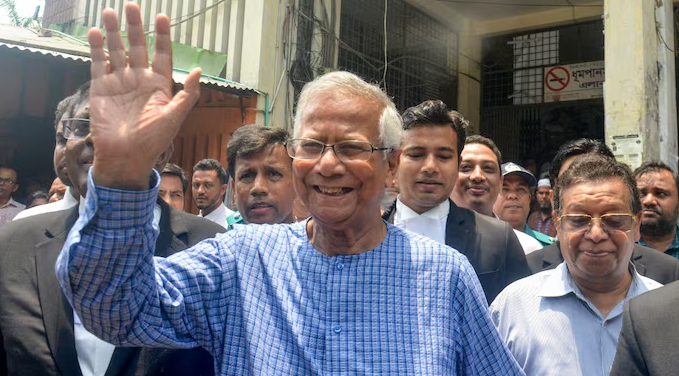Dhaka: The leaders of the Students Against Discrimination Tuesday said they want Nobel laureate Mohammad Yunus as the head of Bangladesh’s interim government, a day after Prime Minister Sheikh Hasina resigned and fled the country following massive protests against her government.
In a video posted on social media early Tuesday morning, Nahid Islam, one of the key coordinators of the movement, said they have already talked with 84-year-old Yunus, who has agreed to take the responsibility to save Bangladesh.
“We have decided that the interim government would be formed in which internationally renowned Nobel Laureate Dr Mohammad Yunus, who has wide acceptability, would be the chief adviser,” said Nahid, flanked by two other coordinators.
He said the names of the other members of the interim government would be announced soon.
His announcement comes hours after President Mohammed Shahabuddin said an interim government would be formed as soon as possible after dissolving the parliament. In a televised address to the nation late Monday night, the president also ordered the release of former Prime Minister Khaleda Zia, who is under house arrest after being convicted in several cases.
Nahid said the group earlier took 24 hours to announce the framework of the interim administration but the chaotic situation forced them to announce the name immediately.
He urged the president to take steps as soon as possible to form an interim government headed by Yunus whose experiment of poor men’s banking earned Bangladesh the repute of being the home of microcredit.
Yunus is currently out of the country but welcomed the ouster of Hasina’s regime, describing the development as the “second liberation” of the country.
According to media reports, at least 119 people have been killed in the last two days of violence across Bangladesh.
On the widespread violence and looting, Nahid said it was being carried out by the “ousted fascists and their collaborators” to foil the revolution.
“As there is anarchy in the country, and insecurity over people’s lives, we are urging the president to take immediate and effective steps to restore law and order in the country, and that freedom-seeking students will also be on the streets to assist law enforcement forces,” he added.
“No government other than the one proposed by the students will be accepted. As we have said, no military government, or one backed by the military, or a government of fascists, will be accepted,” Nahid said.
Yunus won the Nobel Peace Prize in 2006 for his anti-poverty campaign through the Grameen Bank, a mode; which was replicated across continents.
He had been in a protracted row with Hasina’s government due to obscure reasons while authorities initiated a series of investigations against him after she came to power in 2008.
Bangladesh authorities launched a review of the statutory Grameen Bank’s activities in 2011 and fired Yunus as its founding managing director on charges of violating the government retirement regulation.
He was charged under dozens of cases. In January, Yunus was sentenced to six months in jail by a court on charges of labour law violation.
Many people believe Hasina became enraged when Yunus announced that he would form a political party in 2007 when the country was run by a military-backed government and Hasina was in prison.
Yunus, however, did not follow through on the plan but at that time he criticised Bangladeshi politicians alleging they were only interested in money.
In an interview, he expressed his desire to return and continue his work. He praised the students for bringing together and “liberating Bangladesh” and accused Hasina of destroying the legacy of her father Bangladesh’s founder Bangabandhu Sheikh Mujibur Rahman.
Bangladesh descended into chaos Monday as Prime Minister Hasina surreptitiously resigned and fled the country in a military aircraft while the Army stepped in to fill the power vacuum.
As the news of Hasina’s departure spread, hundreds of people broke into her residence, vandalising and looting the interiors, providing dramatic expression to the anti-government protests that have killed more than 300 people in a fortnight.
Hasina’s residence Sudha Sadan and other establishments were attacked, vandalised and set on fire in the capital after her departure. The residences and business establishments of ministers, party MPs and leaders of Hasina’s Awami League government were also attacked in Dhaka and outside Dhaka.
PTI
